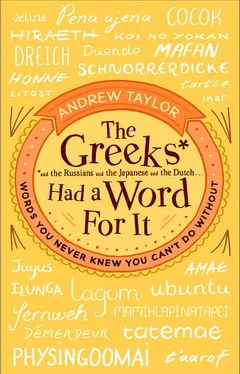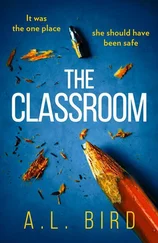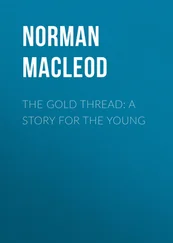Do you ever search in vain for exactly the right word? Perhaps you want to articulate the vague desire to be far away? Or you can’t quite convey that odd urge to go outside and check to see if anyone is coming? Maybe you’re struggling to say there’s just the right amount of something – not too much, but not too little? While the English may not have a word for it, the good news is that the Greeks, the Norwegians, the Dutch or possibly the Inuit probably do.
Whether it’s mafan (a Mandarin word for when you just can’t be bothered) or the Indonesian jayus (a joke so poorly told and so unfunny that you can’t help but laugh), this delightful smorgasbord of wonderful words from around the world will come to your rescue when the English language fails. Part glossary, part amusing musings, but wholly enlightening and entertaining, The Greeks Had a Word For It means you’ll never again be lost for just the right word.
For Sam, Abi and Rebecca,
and Lucy, Sophie and Tom
Words are among the most important things in our lives – somewhere just behind air, water and food. For a start, they’re the way we pass on our thoughts from one to another and from generation to generation. Without words, it’s hard to see how mankind could ever have evolved from ape-like creatures grunting at the entrance to a cave and wondering where they were going to find their next meal.
But words do more than that. They help us define our emotions, our experiences and the things we see. Put a name to something and you have started out on the road to understanding it.
To look at the figures, you’d think that we already have more than enough words in English – estimates vary between five hundred thousand and just over two million, depending on how you count them. And most educated people use no more than twenty thousand words or so, which means that we ought to have plenty to spare. Yet we’ve all had those moments when we want to say something and we can’t find exactly the right one. Words are like happy memories – you can never have enough of them in your head.
And, maybe most important of all in these days of global interaction, when we need to understand each other more than ever before, words say something about us. If people need a word for a particular feeling, or action, or experience, it suggests that they find it important in their lives – the Australian Aboriginals, for instance, have a word that conveys a sense of intense listening, of contemplation, of feeling at one with history and with creation. In Spanish, there’s a word for running one’s fingers through a lover’s hair, and in French one for the sense of excitement and possibility that you may feel when you find yourself in an unfamiliar place.
Words bring us together. They’re precious. And if they’re sometimes very funny, too – well, how good is that?
Physingoomai
(Ancient Greek)
Traditionally, sexual excitement as a result of eating garlic; but in a modern sense, the use of inappropriate adornments to enhance sexual attraction
THERE ARE SOME foreign words the English language clearly needs – the case for them is so obvious that it hardly needs to be put. Others require a little more advocacy on their behalf. Take, for example, the Ancient Greek word physingoomai ( fiz-in-goo-OH-mie ).
It refers to someone who gets over-confident and sexually excited as a result of eating garlic. Fighting cocks were frequently fed garlic and onions before a bout because the Greeks – and later cockfight aficionados – believed that it would make the birds fiercer. The idea is that if men were to follow the example of the fighting cocks and gorge on garlic before going on a date, there would be no holding them back.
Whether or not garlic makes men horny, it certainly makes them smelly and thus less pleasant to be close to. As a result, even in these days when programmes about cooking are all over the television and when people seem more than happy to talk publicly about their sexual preferences, it seems unlikely that it is a word that is going to be used frequently outside the rather restricted world of cockfighting. Even the Ancient Greeks don’t seem to have required it all that often, since the word itself appears only once in the entire canon of Greek literature, referring to some soldiers from the town of Megara in a comedy by Aristophanes.
In the play, however excited the soldiers get, it’s apparent that they are going to have serious difficulties persuading any self-respecting Ancient Greek girls to kiss their garlic-reeking lips. The remedy they have sought to increase their sexual potency at the same time greatly reduces their ability to take advantage of it.
And there lies the clue to why physingoomai would be such a useful term in English. Young men who douse themselves in the sort of cheap aftershave that strips the lining from your nasal passages at first whiff; middle-aged men wearing blue jeans so tightly belted around where their waist used to be that their bellies sag opulently over the top; women of a certain age wearing clothes that would have been daring on their daughters – they are all, if they only knew it, falling into the same trap as the Megaran soldiers.
The adornments they have chosen to boost their confidence and make them more attractive to potential partners are exactly the things that will put those partners off. Cheap aftershave, tight belts and sagging bellies, and clothes that have been clearly stolen from your daughter’s wardrobe can be as effective as a garlic overdose in keeping people at arm’s length. Instead of whatever it was they were hoping for, those who rely on them to enhance their sexual appeal are likely to suffer what we might call a physingoomai experience. And there are few more physingoomai experiences than showing off by using long words to try to impress someone. Just talking about physingoomai could lead to the most humiliating physingoomai experience of all.
Cafuné
(Brazilian Portuguese)
Closeness between two people – for example, to run one’s fingers tenderly through someone’s hair
Think for a moment of the gentleness of affection. It needs a tone and a language of its own – not the urgent, demanding words of love and passion, but gentle, undemanding affection, the sort of love that asks for nothing. It is often so diffident and unassuming that it may sometimes seem to take itself – although never its object – for granted. It may be the warm, safe, family feeling between a mother or father and their child, or the love of grandparents for their grandchildren; perhaps it is the closeness between two people that may some day turn into love, or it may be the relaxed fondness that remains when the fire of a passionate affair has burned low. Either way, it demands its own expression.
In Brazil, they have a phrase that works – fazer cafuné em alguém means to show affection of exactly that sort. More precisely, cafuné ( caf-OO-neh ) often describes the act of running one’s fingers through somebody’s hair – possibly lulling them to sleep, or possibly simply expressing a drowsy fellow-feeling. Between two lovers, it might contain the gentlest hint of a sexual promise, precisely capturing the tender longing of the early days of a couple’s time together.
At other times, though, the word may be translated simply as ‘affection’. Many Brazilians say they are seized by a melancholy nostalgia when they are away from their home and thinking of their family, their religion and their memories. They miss their mother’s rabanada , a sort of French toast topped with sugar, cinnamon and chocolate that is traditionally served at Christmas; their aunt’s bacalhoada , or salted cod stew; and their grandma’s cafuné .
Читать дальше












